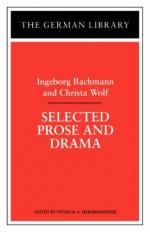|
This section contains 4,040 words (approx. 14 pages at 300 words per page) |

|
SOURCE: “Christa Wolf,” in Meanjin, Vol. 44, No. 1, March, 1985, pp. 100–109.
In the following essay, Gunew discusses Wolf's humanist perspective, her studies of collective memory, and the social construction of identity, particularly female identity, in A Model Childhood, Cassandra, and other works.
For Margrit Braun and Hansi Foks, and for Christa W. who almost came to Australia.
My major interest was to try to find out where it actually started—this appalling split between people and society? When did the division of labor influence people so decisively that literature was pushed farther and farther out of that sphere which society understood and defined as important, essential—indeed present! At the same time, the feminine element is also forced out of society; that's a process which began much earlier, however.
(C. Wolf, New German Critique, 27)
The above was part of Christa Wolf's answer as to why she, an East German, had...
|
This section contains 4,040 words (approx. 14 pages at 300 words per page) |

|


